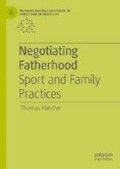Abstract
Traditionally, the terms extended family and extended kin have been used to refer to family members outside of the strictly-defined ‘nuclear family’ or more usefully, two generations of parents and children. The extent to which extended family members are embedded into nuclear family practices varies tremendously in and between cultures. Some cultural groups, such as South Asians, are known to place more value on extended family members, most notably grandparents (Ballard, 1994; Becher, 2009). Ballard (1994) notes how such families were close in terms of both physical and emotional proximity. As a result, many of these families were living in what Smalley (2002) described as ‘nuclear family households, extended family lives’ (cited in Becher, 2009: 150). However, in our contemporary globalised and highly mobile society, how useful is it to think of extended families in terms of proximity? Families are increasingly fragmented and geographically separated, meaning that family members have to find new ways of connecting with one another, for example, forming digital relationships via social media (Baldassar et al., 2016).
Access this chapter
Tax calculation will be finalised at checkout
Purchases are for personal use only
Notes
- 1.
For a discussion of the exclusionary effects of whiteness within some sport club cultures, see Fletcher and Walle’s (2015) analyses of cricket clubs and Pakistani Muslim men in the UK and Norway.
- 2.
Scoring in cricket matches involves two elements—the number of runs scored and the number of wickets lost by each team. The scorer is someone appointed to record all runs scored, all wickets taken and, where appropriate, the number of overs bowled. In professional games, in compliance with the Laws of Cricket , two scorers are appointed, most often one provided by each team.
References
Baldassar, L., Nedelcu, M., Merla, L. and Wilding, R. (2016) ICT-based co-presence in transnational families and communities: Challenging the premise of face-to-face proximity in sustaining relationships. Global Networks, 16(2): 133–144.
Ballard, R. (ed.) (1994) Desh pardesh: the South Asian presence in Britain. London: C. Hurst & Co. Publishers.
Becher, H. (2009) Family practices in South Asian Muslim families. Basingstoke: Palgrave.
Brown, S. (ed.) (2018) Youth sport and social capital. Sport in Society, 21(10): 1499–1641.
Cohen, D.T. (2016) Iron dads: Managing family, work and endurance sport identities. London: Rutgers University Press.
Darcy, S., Maxwell, H. and Edwards, M. (2014) More than a sport and volunteer organisation: Investigating social capital development in a sporting organisation. Sport Management Review, 17: 395–406.
Davies, L.E. (2016) A wider role for sport: community sports hubs and urban regeneration. Sport in Society, 19(10): 1537–1555.
Dionigi, R.A., Fraser-Thomas, J. and Logan, J. (2012) The nature of family influences on sport participation in Masters athletes. Annals of Leisure Research, 15(4): 366–388.
Finch, J. and Mason, J. (1993) Negotiating family responsibilities. London: Routledge.
Finch, J. (2007) Displaying families. Sociology, 41(1): 65–81.
Fletcher, T. and Walle, T. (2015) Negotiating their right to play. Asian-identified cricket teams and leagues in Britain and Norway. Identities: Global Studies in Culture and Power, 22(2): 230–246.
Forsdike, K., Marjoribanks, T., and Sawyer, A.M. (2017) ‘Hockey becomes like a family in itself’: Re-examining social capital through women’s experiences of a sport club undergoing quasi-professionalisation. International Review for the Sociology of Sport. https://doi.org/10.1177/1012690217731292.
Johansson, T. and Bäck-Wiklund, M. (2003) Nätverksfamiljen [The network family]. Stockholm: Natur och Kultur.
Kirk, D. and MacPhail, A. (2003) Social positioning and the construction of a youth sports club. International Review for the Sociology of Sport, 38(1): 23–44.
Kobayashi, T., Nicholson, M. and Hoye, R. (2013) Football ‘wantok’: Sport and social capital in Vanuatu. International Review for the Sociology of Sport, 48(1): 38–53.
Lawrence, S. (2016) ‘We are the boys from the Black Country’! (Re) Imagining local, regional and spectator identities through fandom at Walsall Football Club. Social & Cultural Geography, 17(2): 282–299.
Mikkelsen, M.V. and Blichfeldt, S. (2015) ‘We have not seen the kids for hours’: the case of family holidays and free-range children. Annals of Leisure Research, 18(2): 252–271.
Morgan, D.H. (1996) Family connections: An introduction to family studies. Cambridge: Polity Press.
Morgan, D.H. (2011) Locating ‘family practices’. Sociological Research Online, 16(4): 1–9.
Morgan, D.H. (2013) Rethinking family practices. Basingstoke: Palgrave Macmillan.
Nichols, G. and James, M. (2017) Social Inclusion and Volunteering in Sports Clubs in Europe; findings for policy makers and practitioners in England and Wales [online] available from https://www.sheffield.ac.uk/polopoly_fs/1.738134!/file/SIVSCE-report_final.pdf [accessed March 9, 2019].
Pahl, R. (2000) On friendship. Cambridge: Polity Press.
Schlesinger, T. and Nagel, S. (2018) Individual and contextual determinants of stable volunteering in sport clubs. International Review for the Sociology of Sport, 53(1): 101–121.
Shaw, S.M. and Dawson, D. (2001) Purposive leisure: Examining parental discourses on family activities. Leisure Sciences, 23(4): 217–231.
Spaaij, R. (2011) The glue that holds the community together? Sport and sustainability in rural Australia. In Spaaij, R. (ed.), The social impact of sport: Cross-cultural perspectives. London: Routledge, pp. 24–38.
Sparrman, A., Westerling, A., Lind, J. and Dannesboe, K.I. (eds) (2016) Doing good parenthood: Ideals and practices of parental involvement. Basingstoke: Palgrave Macmillan.
Walle, T.M. (2013) Cricket as ‘utopian homeland’ in the Pakistani diasporic imagination. South Asian Popular Culture, 11(3): 301–312.
Westerling, A. (2016) Parenthood and we-ness in everyday life: Parenting together apart. In Sparrman, A., Westerling, A., Lind, J. and Dannesboe, K.I. (eds), Doing good parenthood. Basingstoke: Palgrave Macmillan, pp. 127–136.
Author information
Authors and Affiliations
Corresponding author
Rights and permissions
Copyright information
© 2020 The Author(s)
About this chapter
Cite this chapter
Fletcher, T. (2020). The Extended Extended Family, Sport and Familial Relationships. In: Negotiating Fatherhood. Palgrave Macmillan Studies in Family and Intimate Life. Palgrave Macmillan, Cham. https://doi.org/10.1007/978-3-030-19784-1_6
Download citation
DOI: https://doi.org/10.1007/978-3-030-19784-1_6
Published:
Publisher Name: Palgrave Macmillan, Cham
Print ISBN: 978-3-030-19783-4
Online ISBN: 978-3-030-19784-1
eBook Packages: Social SciencesSocial Sciences (R0)

